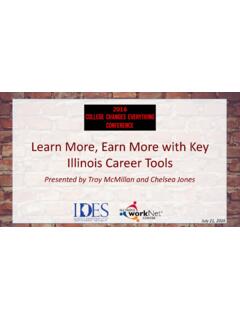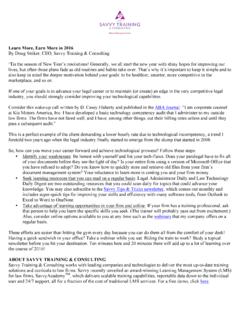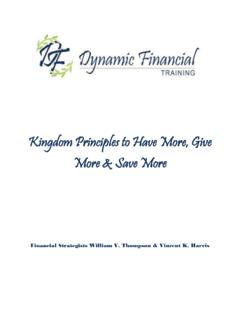Transcription of Learn More, Earn More - OptPerform
1 Resources | Winter 2013 2120 Resources | Winter 2013It used to be so simple. Through De-cember 31, 2012, if you sold your in-surance agency you paid a flat 15% federal tax on any capital gain. As a result, sellers wanted to get as much money up front as they could. There was no advantage to receiving payments over time. Oh, how times have changed!Capital Gains Tax Effective January 1, 2013, the capital gains tax rate has gone up. While it is still 15% for capital gains under $450,000 if married & filing jointly ($400,000 if single), anything over these amounts is taxed at 20%. But it s not as simple as just looking at the capital gains amount. You also need to factor in the rest of your example, assume the capital gain you receive in 2013 from the sale of your agen-cy is $250,000 and you have $100,000 of other income. It s simple your capital gains tax rate is 15%. But what if you have a capital gain of $250,000 and an additional $250,000 of other income?
2 Then $200,000 of the capital gain is taxed at 15% and $50,000 is taxed at 20% (as-suming you are married). And if you have $250,000 of capital gain and $500,000 of other income? The full $250,000 of capi-tal gain is taxed at 20%.To reduce your capital gains tax liability you may consider taking the income over time by structuring it as an installment sale. While you should receive interest on the amount due (which is required by the IRS), you should also consider the risk of the buyer failing to make pay-ments to you. Is it worth it to save on taxes if there is significant risk that you won t get paid?Unearned Income Medicare Contribution TaxIn addition to the increase in capital gains tax, the Health Care and Education Rec-onciliation Act of 2010 (effective in 2013), which amends the Patient Protection and Affordable Care Act, now subjects some individuals to a Medicare contribu-tion tax on unearned income that is, on capital gains in excess of $250,000 for a married couple or $200,000 for an indi-vidual.
3 According to the American Insti-tute of CPAs (www. ) this tax was intended to help pay for health care reform. It functions the same way as the capital gains tax. If you have $250,000 of capital gains and no other income, you don t pay the tax. But when you combine the capital gain with your other income, you pay of tax on every dollar of capital gain that exceeds the $250,000 to-tal income or Ten Year Rule?Many agencies are still C corporations (C corps are taxed separately from their owners). While this is fine for internal perpetuation, the owner runs into signifi-cant tax problems if he wants to sell to a third party. The vast majority of buy-ers insist on an asset sale so they can amortize the purchase price and don t acquire hidden or unknown liabilities. However, an asset sale of a C corpora-tion can result in double taxation for the seller, whereas the asset sale of an S corporation (S corps are not subject to income tax; rather, shareholders of the S corp are subject to tax on their pro rata share of the income) is taxed one time at the capital gains rate.
4 If the seller wants to convert from a C corp to an S corp, he or she normally must wait 10 years (from conversion date) before getting full tax treatment as an S corp. In 2013, the 10-year rule is a 5-year rule. This means that the agency must have converted from a C corp to an S corp at least five years ago and then sell before the end of 2013. So if your agency con-verted from a C corp to an S corp between 2004 and 2008 and you sell the agency before December 31, 2013, you can avoid the built-in capital gains tax that will be assessed against S corporations which sell before completing the 10-year period. It should be noted that starting January 1, 2014, the waiting period goes back up to 10 years, assuming Congress doesn t make any changes to the law. While this change doesn t help you if you are still a C corporation, you should seriously consider converting to S sta-tus as soon as possible to start the clock running on your ten-year period (or five years, if Congress makes this a perma-nent change).
5 To convert to an S corpo-ration all you need to do is file a Form 2553 within 75 days after the end of your fiscal year. You should also consider hav-ing your agency valued by a third party so that you can limit the amount subject to the built-in capital gains tax should you sell before completing the waiting Selling?If you aren t selling, there are still some significant tax saving measures you should consider. Many agency owners are sole proprietorships. In this case, the owner pays Medicare tax on the entire amount of income that is generated from the agency. So if you take home $300,000, you pay in Medicare tax, or $8,700. And starting with 2013, you are also sub-ject to a Medicare surtax on income over $250,000 ($200,000 if single), which will cost you an additional $ let s assume you become an S cor-poration and decide to take a salary of $150,000, and let $150,000 become K-1 income (profit from the S corporation), which then flows onto your personal tax return.
6 Now your Medicare Tax is only $4,350 and there is no surtax to pay. This results in a savings of $4,800 in this you are selling your agency now or keeping it for many years, tax planning can be very complex. Don t stay a C corp or a sole proprietorship because that s what I ve always been. Speak with a tax professional. A little bit of planning now can save you hundreds of thousands of dollars in the future. nAbout the Author: Jon Persky, CPA, CIC, PHR Jon Persky is the President of Optimum Performance Solutions, LLC, an insurance agency consulting firm providing valuation, merger and acquisition, and agency perpetuation,strategic planning, and marketing and retention services to insurance agencies nationwide. Jon is the author of The Academy s publication, Maximizing Agency Value II, and has a new book on agency acquisitions and perpetuation coming out in early 2014. He is a member of the CIC national faculty and teaches agency perpetuation at a number of Ruble Graduate Seminars, as well as other venues.
7 He can be contacted at 813-835-7337 or Learn more , earn MoreTo Learn valuable information about how to improve agency performance, attend a CIC Agency Management Institute. In addition, you may want to obtain a copy of The National Alliance Research Academy s book, Maximizing Agency Value II, which provides a wealth of information on buying and selling agencies. Also available is Critical Factors Affecting Agency Value, which focuses specifically on the most effective ways to maximize the value of your agency.










